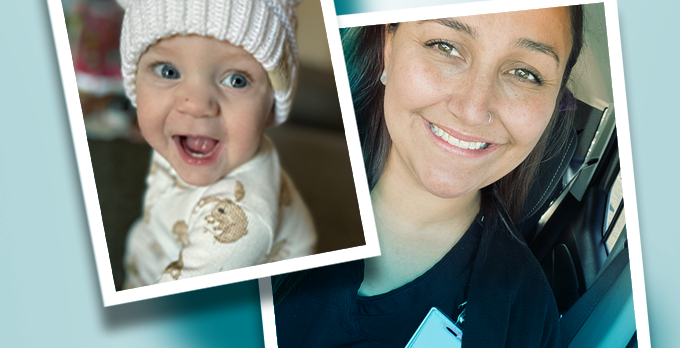Many nurses describe the job they do every day as a calling. But for one nurse at The University of New Mexico Children’s Hospital, her life’s calling came the day she was asked to take care of a newborn—not as a nurse, but as a mother.
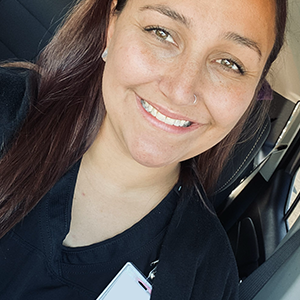
Olivia Peña, RN, works in the general pediatrics unit on the sixth floor of UNM Children’s Hospital. Some of the youngest, most vulnerable children in the state have been under her care.
“I was hired on straight out of nursing school,” Peña said smiling. “I am very grateful for my unit; I just love them.”
Peña’s job in pediatrics often puts her in positions to comfort children and their parents as they face the unknown.
The Call
On a winter day in 2022, it was Peña who found herself facing the unknown. She was on her shift at the hospital when her cell phone rang. It was a caseworker from the New Mexico Children, Youth and Families Department (CYFD). In addition to being a nurse, and a mother of two, Peña had also been a foster mom for many years.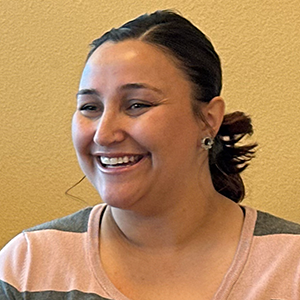
When they called me, they said, ‘here's the situation, here's the child. Are you interested in fostering?’ I have a role as a foster mom and I don’t jump into anything I don’t feel my family can handle.
“When they called me, they said, ‘here's the situation, here's the child. Are you interested in fostering?’”
During that first call, Peña said the details were vague. She was told the baby girl was born premature and was currently in the neonatal intensive care unit (NICU) at UNM Children’s Hospital, just one floor away from where Peña was taking the call.
“I have a role as a foster mom,” Peña said. “I don’t jump into anything I don’t feel my family can handle. It takes a village to raise a family, and I need that village every time I'm bringing a new kiddo into my household.”
So, Peña called her support team: her husband, her mom and her two biological children, who at that time were 10 and 13 years old.
“Everybody said yes; everybody was on board,” Peña said. “And then I was in full panic mode. I had no baby stuff. I had nothing.”
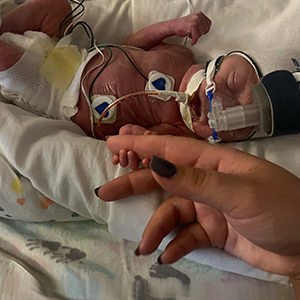
The Visit
Peña and her husband, Alejandro Plascencia, went to the NICU to meet the baby girl who they only knew by name, Addison. Post-COVID restrictions were still in place at the hospital, meaning only one person could go into the NICU at a time. Plascencia went in first.
“He was able to go in there and hold her,” Peña said. “When he came out, he was in shock, and he warned me. He said, ‘she is so tiny.’”
When Peña went into the NICU next, she understood. Born more than four weeks premature, Addison weighed just 2 pounds.
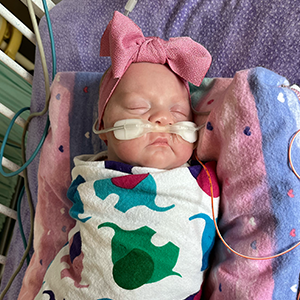
It was scary with all the cords and wires and monitors and everything that was happening, but I tell everybody - I fell in love with her the second I saw her.
“It was scary with all the cords and wires and monitors and everything that was happening.” Peña had never cared for a NICU baby before. “But I tell everybody - I fell in love with her the second I saw her.”
And it was then that Peña and her husband found out about Addison’s extensive medical complications. She was ‘failing to thrive’, a term used for children who are not developing or growing normally. Addison was hemorrhaging on both sides of her brain, causing seizures. Her lungs weren’t fully developed so she was relying on a breathing machine to keep her airways open.
“It was unreal. It was, definitely ‘oh, my gosh, look at this tiny little thing, fighting for her life,’” Peña said. “And I knew from that very moment that I was going to be by her side, and we were going to make it work.”
That’s exactly what happened. Any chance she got, Peña went to the NICU to see Addison, to hold her, to talk to her. Whether it was on her days off, or in between shifts, Pena was there.
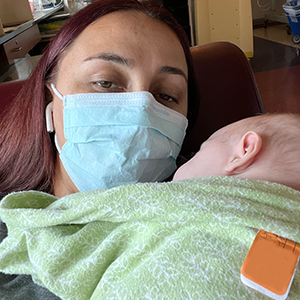 “I went to see her every day, even if it was for 15 minutes. I wanted her to know my voice and my laugh. I was holding her and just telling her about my day or, telling her about what she was going to go home to. I wanted her to hear me every single day.”
“I went to see her every day, even if it was for 15 minutes. I wanted her to know my voice and my laugh. I was holding her and just telling her about my day or, telling her about what she was going to go home to. I wanted her to hear me every single day.”
Month after month, Addison kept getting stronger and stronger. With the love and support from Peña and her husband and the NICU team at UNM Children’s Hospital, baby Addison started to thrive.
“I loved all my nurses and doctors,” Peña said. “They were all supportive and understanding of her situation and who I was coming into her life.”
The Email
After several months in the NICU, it was almost time for Addison to go home. As a foster mother, Peña knew her home would only be a temporary one for Addison. It’s part of the role she signed up for. For the past seven years, Peña had taken care of and loved children until it was time to let them go.
That doesn’t mean letting go is easy. At that moment Peña didn’t know how long she was going to be in Addison’s life, but that didn’t change her commitment or her love.
Then late one night, while Addison was still in the NICU, Peña got an email from Addison’s biological mother.
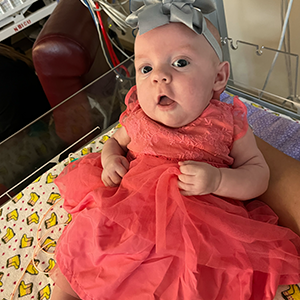
I had built a good relationship with her biological mom. That night I received an email from her, and it was so heartfelt and so emotional. She had made a decision, the hardest decision that anyone can make, that Addison was in the best place she could be, with me.
“I had built a good relationship with her biological mom, and she was really involved at that time,” Peña said. “That night I received an email from her, and it was so heartfelt and so emotional. She had made a decision, the hardest decision that anyone can make, that Addison was in the best place she could be, with me.”
Addison’s biological mother wanted Peña to adopt Addison.
“I was shaking, and I was crying,” Peña said. “For her to make that sacrifice, I know that decision was so difficult for her. So, on one hand, I was so happy. And on the other hand, I was so sad. It's a hard decision. I'm a mom of my own children, so I could never imagine making that decision. And she did it. And I'm so proud of her.”
Peña agreed to adopt Addison and just a few days later, after six months in the NICU, Addison was ready to go home to what was now her home with Pena.
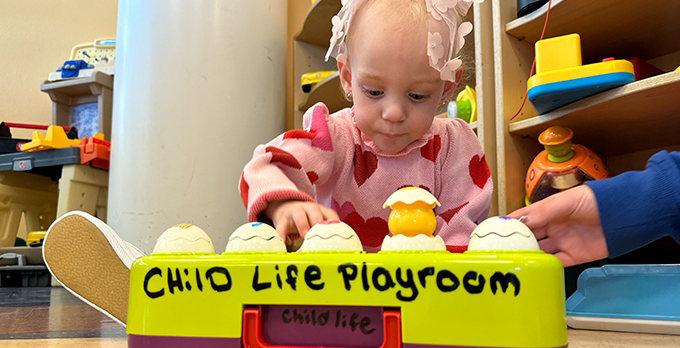 The Future
The Future
Two years later, sitting in the Child Life playroom at UNM Children’s Hospital, the bright, blonde, blue-eyed Addison plays happily with toys while her mom shares their story. The time since leaving the NICU hasn’t been easy, but watching Addison play, and call out, “mom, mom,” it’s hard to tell.
“If you look at her now, you’d never guess what she’s been through,” Peña says. “She does still deal with a lot. We have a lot of obstacles that we're going through. She still has an active hole in her heart. She’s developmentally delayed and there is a possibility of her being on the spectrum."
But Peña says most importantly, Addison is happy.
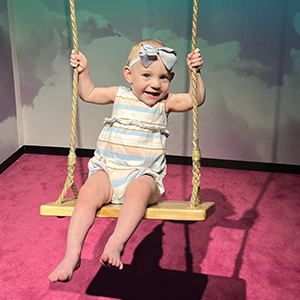 “She has such a wild and exciting, upbeat personality. It's just amazing to see how happy and loving and outgoing she is, and she's only two. She's very, very funny, and so smart.”
“She has such a wild and exciting, upbeat personality. It's just amazing to see how happy and loving and outgoing she is, and she's only two. She's very, very funny, and so smart.”
Peña says Addison is her last foster child, but not her last baby.
“I am expecting my fourth and final child and it's going to be a little girl. So, Addison's going to grow up with a best friend.”
While she packs up Addison to head home for a nap, Peña recalls the other foster children she’s helped along the way, watching them grow and giving them her love.
“If you're a foster parent and you're doing it for the right reasons, that's what makes it feel like an accomplishment,” Peña says. “We do have to learn to love and let go because these aren't our children.”
But smiling down at Addison, Peña admits, “I'm very lucky because I don't have to let go of her.”
